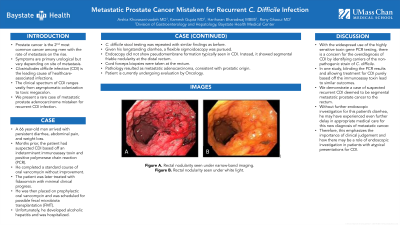Monday Poster Session
Category: General Endoscopy
P2015 - Atypical Presentation of Metastatic Prostate CA Mistaken for Recurrent Clostridiodes difficile Infection
Monday, October 23, 2023
10:30 AM - 4:15 PM PT
Location: Exhibit Hall

Has Audio
.jpg)
Arshia Khorasani-Zadeh, MD
UMass Chan-Baystate
Springfield, MA
Presenting Author(s)
Arshia Khorasani-Zadeh, MD1, Kamesh Gupta, MD2, Hariharan Bharadwaj, MBBS1, Rony Ghaoui, MD3
1UMass Chan-Baystate, Springfield, MA; 2University of Massachusetts-Chan Baystate Medical Center, Springfield, MA; 3University of Massachusetts Chan Medical School-Baystate, Springfield, MA
Introduction: Prostate cancer is the second most common cancer among men with rates of metastasis on the rise. Symptoms are primary urological however may range widely with depending on site of metastasis. Clostridiodes difficile infection (CDI) is a leading cause of healthcare-associated infections. The clinical spectrum of CDI ranges from asymptomatic colonization to toxic megacolon. Here we will focus on a case of metastatic adenocarcinoma of the prostate mistaken for recurrent CDI indistinguishable clinically requiring endoscopic and pathologic investigation.
Case Description/Methods: 66 M who had complaints of persistent diarrhea, abdominal pain, and weight loss. Months prior the patient had known C. Difficile testing demonstrating an indeterminant immunoassay toxin, and positive toxin polymerase chain reaction (PCR) and had completed a standard course of vancomycin, without improvement. This course was later repeated with fidaxomicin again without much improvement. He was placed on prophylactic vancomycin and scheduled to be evaluated for possible fecal transplantation (FMT), however he presented to our facility for alcohol related hepatitis. Patients stool testing on this admission resulted the same, however with his longstanding history of unresolving diarrhea flexible sigmoidoscopy was pursued. Endoscopic findings did not demonstrate any pseudomembrane however segmental friable nodularity at the level of the distal rectum. Cold forceps biopsies of the rectum and random biopsies taken from the remainder of the colon. Biopsy of the rectum resulted as metastatic adenocarcinoma, consistent with prostatic origin. Patient is currently undergoing evaluation by oncology
Discussion: With the widespread use of highly sensitive toxin gene PCR testing, came the concern for overdiagnosis of CDI, identifying carriers of non- pathogenic strain of C. Difficile. This was well illustrated by Polage et Al. whereby blinding for the PCR and allowing treatment for CDI purely driven off the immunoassay toxin lead to similar outcomes. We demonstrate a case of suspected recurrent CDI destined for FMT work-up which deemed to be segmental metastatic prostate cancer to the rectum. Without further endoscopic investigation for this patient’s diarrhea he may have experienced even further delay in appropriate medical care for this new diagnosis of metastatic cancer. Therefore, this emphasizes the importance of clinical judgement and how there may be a role of endoscopic investigation in patients with atypical presentations for CDI.

Disclosures:
Arshia Khorasani-Zadeh, MD1, Kamesh Gupta, MD2, Hariharan Bharadwaj, MBBS1, Rony Ghaoui, MD3. P2015 - Atypical Presentation of Metastatic Prostate CA Mistaken for Recurrent Clostridiodes difficile Infection, ACG 2023 Annual Scientific Meeting Abstracts. Vancouver, BC, Canada: American College of Gastroenterology.
1UMass Chan-Baystate, Springfield, MA; 2University of Massachusetts-Chan Baystate Medical Center, Springfield, MA; 3University of Massachusetts Chan Medical School-Baystate, Springfield, MA
Introduction: Prostate cancer is the second most common cancer among men with rates of metastasis on the rise. Symptoms are primary urological however may range widely with depending on site of metastasis. Clostridiodes difficile infection (CDI) is a leading cause of healthcare-associated infections. The clinical spectrum of CDI ranges from asymptomatic colonization to toxic megacolon. Here we will focus on a case of metastatic adenocarcinoma of the prostate mistaken for recurrent CDI indistinguishable clinically requiring endoscopic and pathologic investigation.
Case Description/Methods: 66 M who had complaints of persistent diarrhea, abdominal pain, and weight loss. Months prior the patient had known C. Difficile testing demonstrating an indeterminant immunoassay toxin, and positive toxin polymerase chain reaction (PCR) and had completed a standard course of vancomycin, without improvement. This course was later repeated with fidaxomicin again without much improvement. He was placed on prophylactic vancomycin and scheduled to be evaluated for possible fecal transplantation (FMT), however he presented to our facility for alcohol related hepatitis. Patients stool testing on this admission resulted the same, however with his longstanding history of unresolving diarrhea flexible sigmoidoscopy was pursued. Endoscopic findings did not demonstrate any pseudomembrane however segmental friable nodularity at the level of the distal rectum. Cold forceps biopsies of the rectum and random biopsies taken from the remainder of the colon. Biopsy of the rectum resulted as metastatic adenocarcinoma, consistent with prostatic origin. Patient is currently undergoing evaluation by oncology
Discussion: With the widespread use of highly sensitive toxin gene PCR testing, came the concern for overdiagnosis of CDI, identifying carriers of non- pathogenic strain of C. Difficile. This was well illustrated by Polage et Al. whereby blinding for the PCR and allowing treatment for CDI purely driven off the immunoassay toxin lead to similar outcomes. We demonstrate a case of suspected recurrent CDI destined for FMT work-up which deemed to be segmental metastatic prostate cancer to the rectum. Without further endoscopic investigation for this patient’s diarrhea he may have experienced even further delay in appropriate medical care for this new diagnosis of metastatic cancer. Therefore, this emphasizes the importance of clinical judgement and how there may be a role of endoscopic investigation in patients with atypical presentations for CDI.

Figure: Figure A: Rectal nodularity under Narrow Band Imaging
Figure B: Rectal nodularity under White Light
Figure B: Rectal nodularity under White Light
Disclosures:
Arshia Khorasani-Zadeh indicated no relevant financial relationships.
Kamesh Gupta indicated no relevant financial relationships.
Hariharan Bharadwaj indicated no relevant financial relationships.
Rony Ghaoui indicated no relevant financial relationships.
Arshia Khorasani-Zadeh, MD1, Kamesh Gupta, MD2, Hariharan Bharadwaj, MBBS1, Rony Ghaoui, MD3. P2015 - Atypical Presentation of Metastatic Prostate CA Mistaken for Recurrent Clostridiodes difficile Infection, ACG 2023 Annual Scientific Meeting Abstracts. Vancouver, BC, Canada: American College of Gastroenterology.
